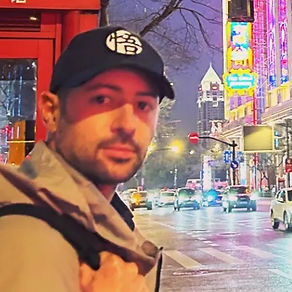
Riley Miladi
Lead ML Researcher at Cinesite, London
>> Empowering Artists through Machine Learning: Balancing Creativity and Control
Abstract: Recent advances in generative modelling have enabled the creation of videos, paintings, and songs from simple inputs like text. Models such as Stable Diffusion and SORA have made it possible for anyone to produce impressive results. However, these tools often come at the expense of losing artistic control and creativity.
In this talk, we will explore the intersection of technology and creativity. how these models can undermine artists' creative processes and why they might not be ideal for production settings. We will discuss strategies for developing Machine Learning tools that truly empower artists and enhance, rather than hinder, artistic expression.
We will also showcase some of the Machine Learning tools developed at Cinesite. These tools have enabled artists to produce higher quality work more efficiently while maintaining full control over their creative processes. Additionally, we will examine common challenges in translating cutting-edge research into practical, artist-friendly tools for production.
.
Bio: Riley Miladi is the lead ML researcher at Cinesite, researching AI driven solutions for films and feature animations. With a background in Visual Effects from the University of Hertfordshire, they created physical simulations and procedural setups for film and games. Later they transitioned to a ML research position at Embark Studios focusing on Deep Reinforcement Learning and physically based animation for games. More recently during their position as a researcher at DNEG, they had the opportunity to do further research on Generative Models for animation and crowds for VFX and animation. They currently focus on leading various machine learning projects as well as leading the development of global machine learning strategy at Cinesite.
Riley specialize in deep RL and generative models with an emphasis on ML based animation and human motion but they have contributed to diverse projects in domains such as: geometric deep learning, computer vision, NLP and representation learning. Driven by a deep passion for machine learning, neuroscience, robotics, physics, and art, Riley is eager to research cutting edge solutions to create tools that empower artists and unleash their creativity.

Cari Watterton
Accessibility Lead at Rebellion, Dundee
>> Advancing Accessibility in Games: A Research Wishlist
Abstract: Cari presents her accessibility research ‘wishlist’ - a list of research topics that could help advance accessibility in gaming. This seeks to inspire and guide efforts to make games more inclusive for all players by using research to innovate, test and validate new approaches to accessibility barriers in gaming.
Bio: Cari Watterton is an indie developer with a background in UX and a passion for creating games for everyone, with intuitive experiences and player-centred design at the core. Currently she is the Senior Accessibility Designer at Rebellion. In this role she has helped to enhance the accessibility of Sniper Elite 5 and has been directing the accessibility initiative at Rebellion; from internal education and accessibility testing processes to external advocacy and knowledge sharing. She is a Develop: Star and BAFTA Games nominee, two-time DARE finalist and Abertay University Alumni. Outside of work she has an unhealthy amount of board games, a love of dice and a black cat called Toothless.

Nasos Kokkinakis
Postdoctoral Researcher at Zhejiang University, China
>> Not a Mirage: Expectancy Violation causes migraines, nausea and accounts for the Uncanny Valley Effect
Abstract: Headaches and adjacent diseases (e.g. epilepsy) are the most common neurological diseases and have a tremendous personal and economic impact yet these diseases remains relatively underexplored. Unexpectedly, a significant contribution comes from the field of videogames. In 2018, Valve introduced a rotated game environment for DOTA 2. Users reported nausea, headaches and uncanny feelings e.g. a constant state of eeriness or disgust. In this talk we are going to examine this phenomenon in detail, talk about the latest research in Uncanny Valley, and highlight many testimonies of individuals that experienced it. We will provide advice on how to study it in the lab that may not be readily apparent e.g. using mirrored CS:GO maps, and we will mention some common pitfalls from our personal experience. We will then ask how this phenomenon can be used to study headaches and epilepsy. We believe that exposing healthy participants to induced migraines, through the use of modified virtual environments, combined with EEG and fMRI, can greatly enhance our understanding of these diseases.
Bio: Nasos Kokkinakis is a Postdoctoral Researcher for Zhejiang University. He is an iGGi Alumnus with a PhD in Computer Science, an MSc in Cognitive Neuroscience and a BSc in Psychology. His research focuses on how we can use large videogame datasets to identify real life correlates, e.g. linking videogame Rank with fluid intelligence, age and rotational working memory. He is currently using EEG to understand more about the topics of Cybersickness, Visual Discomfort, Headaches, Virtual Motion and Visual Illusions.
-
General Chairs: Debbie Maxwell, James Walker
-
Programme Chair: Alan Pedrassoli Chitayat, Lauren Winter
-
Social Media/Marketing Chair: Lauren Winter
-
Poster Chair: Nicole Levermore
-
Local Chairs: Steph Carter, Tania Dales
-
General Management: Tracy Dancer, Helen Tilbrook
-
Industry Liaison/Website: Susanne Binder


